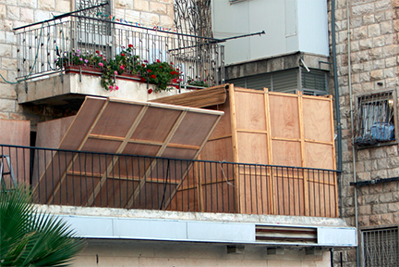Temporary sukkah hut on condo balcony
Here is an example of a Code right (creed) versus a common law right (right to peaceful enjoyment of property).
In this example, a Jewish family is asked to remove a sukkah hut that they placed on their condominium balcony for religious celebration. The sukkah hut would normally stay up for nine days.
The sukkah hut does not comply with the condo’s by-laws and the neighbours are complaining that it’s interfering with their enjoyment of their property. They also claim that their property value will decrease.
The Jewish family claims that despite the condo’s by-laws, they have a right to accommodation under the Code because of their religion (creed). The condominium co-owners argue that they have a common law right to peaceful enjoyment of property.

Here are some discussion questions to think about:
- In this case, do you think one right should be treated as more important than the other? Why?
- What do you think is the best way to deal with this situation?
- Will anyone have to compromise? Why?
This example is based on a real case, Syndicat Northcrest v. Amselem. In this case, a Jewish family was asked to remove a sukkah because it did not comply with the condominium’s by-laws and was interfering with the neighbours’ enjoyment of their balcony. The Supreme Court refused to engage in a balancing process under section 1 of the Charter between freedom of religion as it affected the right to peaceful enjoyment and free disposition of property, since, in the Court’s view, the effect on the Jewish family was substantial while the effect on the co-owners was “at best, minimal,” and therefore limiting religious freedom could not be justified.
Here's a link to the court ruling on this case.


